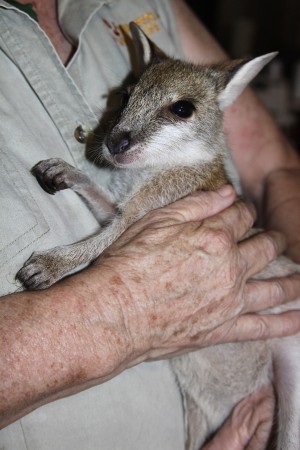
This recent undated handout photo received on May 1, 2014 by Australia’s Department of Parks and Wildlife shows a seized wallaby joey which was rescued from a Broome car park by officers from the Department of Parks and Wildlife and Western Australia (WA) Police after it was posted for sale on Facebook. A man is facing charges after he allegedly attempted to sell the baby wallaby on Facebook, attracting bids as high as 10,000 Australian dollars (9,291 USD) before he was caught, officials said on May 1, 2014. AFP PHOTO / Parks and Wildlife Department
SYDNEY–A man is facing charges after he allegedly attempted to sell a baby wallaby on Facebook, attracting bids as high as Aus$10,000 (US$9,291) before he was caught, officials said Thursday.
The marsupial was rescued by Western Australia’s Department of Parks and Wildlife after an officer posing as a potential buyer met the man in a car park in Broome, in the state’s north.
The 26-year-old, who faces five offenses under the Wildlife Conservation Act, had allegedly advertised the joey for sale for Aus$3,500, wildlife officer Peter Carstairs said.
“We understand there was an offer of up to Aus$10,000 from a buyer visiting from overseas,” Carstairs said of the wallaby, a native animal which resembles a smaller version of the kangaroo.
The man faces penalties of up to Aus$4,000 for some of the charges he faces, which include possession of and selling of protected fauna.
Carstairs said the department became aware of the situation after local residents complained.
“The community outrage generated by this incident shows that people really care about protecting our native wildlife,” he told national broadcaster ABC.
“It is illegal to sell or possess any part of a native animal in Western Australia unless you have a wildlife license. There is a black market trade in Australian wildlife and it is a practice that must be stopped.”
The joey, which had been brought into Western Australia from neighboring Northern Territory, is being cared for by wildlife experts.
It will eventually be returned to the Northern Territory and released into the wild.